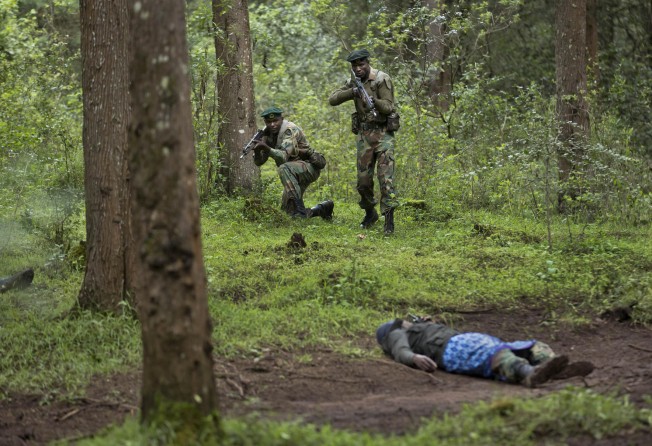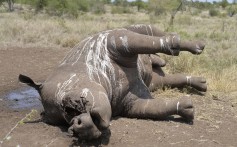
Africa gets tough in war on poachers
In Africa's war on poaching, national parks are now battlefields where the latest military technology is deployed. Hunters have become the hunted

Africa is getting tougher in its fight against poaching. New laws with stiff penalties, more military training for rangers and new technology, including drones with thermal cameras, are all helping to protect rhinos and elephants. A new law in Kenya that increases penalties for killing tourist-attracting safari animals is already bearing fruit.

Last week a Chinese man accused of trying to smuggle ivory in a suitcase was arraigned in a Nairobi court.
Under a new law, long demanded by the Kenya Wildlife Service, that came into effect on January 10, the man could face life in prison and a US$230,000 fine. In the past, poachers and smugglers could walk out of court with a fine less than US$1,000.
On Thursday, Hong Kong announced it would destroy most of its stockpile of confiscated illegal ivory, in a process that could take up to two years. The decision followed similar actions by the mainland, the United States and the Philippines.
Poachers "have to think twice now", says Paul Mbugua, spokesman for the Kenya Wildlife Service. "You just try your luck on the poaching, but the moment we catch up to you, you are done."
Kenya's new law is being paired with increased training and deployment of advanced equipment.
Kenya's Ol Pejeta Conservancy will deploy drones later this year to help protect rhinos. Parks in Tanzania and South Africa are also increasing their use of surveillance drones.
In South Africa's massive Kruger National Park, where hundreds of rhinos are killed each year, rangers are hunting for poachers using a former military helicopter and night-vision equipment provided by a private company.
Poachers killed around 280 elephants in Kenya last year, a huge number but down from 2012, when 384 were killed. Kenya's elephant population is estimated at around 35,000. Other countries in the region, such as Tanzania, have seen tens of thousands of elephants killed over the last couple of years. Wildlife experts say anywhere between 20,000 and 30,000 African elephants are being killed per year.
Watch: Poaching in East Africa: urgent action needed to save elephants
Hong Kong is a major transit point for illegal ivory sent to China and officials have seized about 33 tonnes of ivory in the past decade, one of the biggest stockpiles in the world. Some 28 tonnes of ivory now held by the Agriculture, Fisheries and Conservation Department will be incinerated at a chemical waste facility in Tsing Yi. The rest will be donated for education and research.
More than six tonnes of confiscated ivory were destroyed in Dongguan , Guangdong earlier this month in an unprecedented effort to combat the illegal trade in elephant tusks by the world's biggest ivory consumer.
During a three-day training session last month on the slopes of Mount Kenya, a dozen Kenyan wildlife agents crouched behind a bush as they waited for two men acting as poachers. Standing nearby, a team of British paratroopers lead the training.
During the exercise, about a dozen rangers from the Kenya Wildlife Service and the Kenya Forest Service crept through the woods, using hand signals to move as silently as possible. A mountain river bubbled in the background as the team set up an ambush and waited for the pretend poachers to pass. When they did, the rangers unleashed 30 seconds of blank rounds on the two men.
In a real case of poaching, both sides would be armed. The rangers would shoot to kill.
One of the rangers, John, helps protect rhinos on a private ranch near Mount Kenya. In November his team killed a poacher in a pre-dawn battle from which one poacher escaped.
"Every day gunshots are reported," says John, 26. "You must be very keen and see them first. Otherwise you are dead."

Five on-duty rangers were killed last year.
Poachers, John says, mostly work at night when the moon is close to full. His platoon of 36 men have three sets of night vision goggles between them, but poachers often have such goggles, too, he says.
The joint exercise helped the sides enhance and exchange knowledge on counter-poaching tactics, Christie says.
"From what I see in the papers the problem isn't getting better. This is part of an overall plan, a small microchip of a UK contribution," Christie says.
In South Africa, a park ranger describes a war of attrition in which poaching syndicates dispatch an endless stream of triggermen, some with military training, to hunt rhinos for their horns. Seven suspected poachers died in four separate confrontations with rangers last weekend.
"Currently, they're trying to overwhelm us," says Bruce Leslie, a conservationist-turned-combatant in Kruger National Park, South Africa's flagship game reserve. "They're just trying to send in the masses, the cannon fodder, if you like. Expendable people. It's the middle men that actually need to go to jail."
Rangers want to operate more effectively at night, a task made somewhat easier with the donation last year of a former British military helicopter that enables pilots to scout with night vision equipment and thermal cameras. The Gazelle helicopter was donated by businessman Ivor Ichikowitz on behalf of his family foundation and Paramount Group, a South African aerospace and defence firm he founded.
"He who owns the night wins the war. So far, the poachers have been owning the night," says David Mabunda, CEO of South African National Parks. He hopes the new equipment will swing the balance in the rangers' favour.
Kruger's rangers, who get help from South African National Defence Force troops, also use low-tech approaches. They follow poachers' tracks with sniffer dogs and spend days in the bush with minimal gear.
Park officials say poachers often slip across the border from neighbouring Mozambique. Periodic shootouts usually occur far from tourists, who can only visit about 7 per cent of a park that is the size of some small countries.
Home to most of Africa's rhinos, South Africa lost 1,004 to poachers last year, more than half of them in Kruger. The horn is sold for high prices in parts of Asia, particularly Vietnam, where some view it as a status symbol and a medicine, despite no evidence it can cure ailments.
The British government will next month host a conference attended by Prince Charles on the illegal wildlife trade to improve the prospects for the world's elephants, rhinos and tigers.
Additional reporting by staff reporters